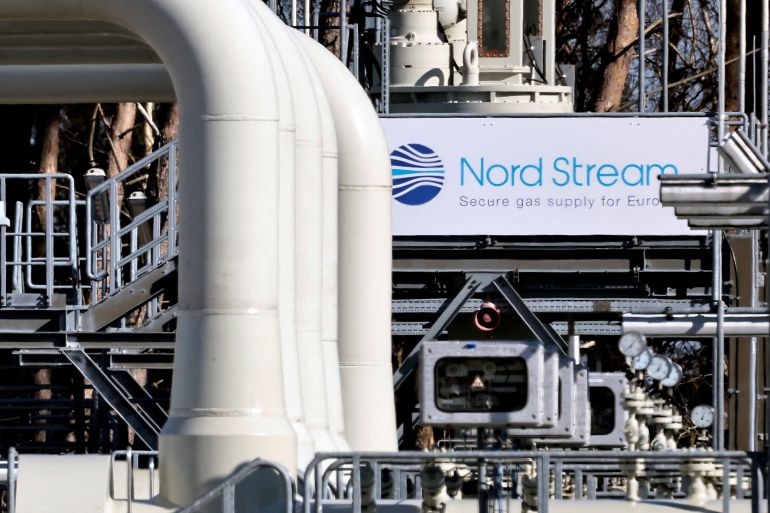Ukraine summons Canadian envoy over turbine return to Germany
Ukraine’s president says return of repaired turbine for Nord Stream 1 pipeline maintenance ‘absolutely unacceptable’.

Ukraine has summoned Canada’s envoy to the country, President Volodymyr Zelenskyy said, in protest of the Canadian government’s decision to return a turbine to Germany for maintenance on the Nord Stream 1 gas pipeline.
In his late-night address on Monday, Zelenskyy slammed Canada’s move as an “absolutely unacceptable” breach of sanctions against Russia and warned it would be viewed by Moscow as a “manifestation of weakness”.
Keep reading
list of 3 itemsRussia creates ‘true hell’ in eastern Ukraine offensive: Governor
Ukraine investigates, attacks those who collaborate with Russia
“If a terrorist state can squeeze out such an exception to sanctions, what exceptions will it want tomorrow or the day after tomorrow?” said Zelenskyy, according to an English translation of his speech posted on his office’s website.
Canada’s decision to return the repaired turbine to Germany, which could help to ensure continued flows of energy until Europe can end its dependency on Russian gas, has sparked anger from the Ukrainian government as well as Ukrainian advocacy groups in Canada.
Ukraine’s energy and foreign ministries have said the decision amounts to adjusting sanctions imposed on Moscow in the aftermath of its invasion of Ukraine in late February “to the whims of Russia”.
On Monday, the Ukrainian Canadian Congress advocacy group also called for a parliamentary committee to convene hearings on the government’s decision, saying the move “will embolden Russia to further aggression” in Ukraine.
But the Canadian government has defended its decision, saying in a statement on Saturday it was issuing a “time-limited and revocable permit” to exempt the return of turbines from its Russian sanctions.
Russia last month cited the delayed return of the turbine, which Germany’s Siemens Energy has been servicing in Canada, as the reason behind its reduction of flows to 40 percent of capacity through the Nord Stream 1 gas pipeline from Russia to Germany.
Europe, which is trying to wean itself off Russian energy supplies amid the war in Ukraine, imports about 40 percent of its gas and 30 percent of its oil from Russia. The Nord Stream 1 pipeline transports 55 billion cubic metres (bcm) a year of gas from Russia to Germany under the Baltic Sea.
The Canadian government said shipping the equipment to Europe would support “Europe’s ability to access reliable and affordable energy as they continue to transition away from Russian oil and gas”.
In addition to the special permit for the turbine, Canada said it would expand sanctions against Russia’s energy sector to include industrial manufacturing.
“We are unwavering in our support for Ukraine. We will continue to target Russia’s coffers. We will not relent in pressuring the Russian regime,” Foreign Minister Melanie Joly said on Saturday.
The United States also said it backs Canada’s decision to return the turbine.
“In the short term, the turbine will allow Germany and other European countries to replenish their gas reserves, increasing their energy security and resiliency and countering Russia’s efforts to weaponize energy,” State Department Spokesperson Ned Price said in a statement on Monday.
The U.S. supports Canada’s decision to return a turbine to Germany to counter Russia’s efforts to weaponize energy. We are grateful for the partnership with Canada and Germany to hold President Putin accountable for his unjustifiable war against Ukraine. https://t.co/qTkhb9uasX
— Ned Price (@StateDeptSpox) July 11, 2022
It was not clear how long it would take for the turbine to be returned.
Meanwhile, Ukrainian Ambassador to Canada Yulia Kovaliv told Canada’s public broadcaster CBC that Ukraine will continue to discuss the issue with the Canadian government in the coming weeks.
“We do appreciate a lot of support that the Canadian government provided to Ukraine in different spheres, and we still hope that this decision will be revoked,” Kovaliv said in an interview with CBC program Power & Politics.
The tensions come after Nord Stream 1 shut down for annual maintenance on Monday, as Berlin grew concerned that Moscow may not resume the flow of gas as scheduled.
The Nord Stream 1 pipeline, Germany’s main source of Russian gas, is scheduled to be out of action until July 21 for routine work that the operator says includes “testing of mechanical elements and automation systems”.